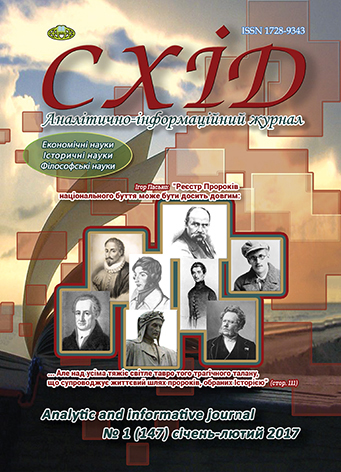The problem of preservation of national identity of the ukrainian diaspora (for example, ukrainian canadian in the second half of the twentieth century)
DOI:
https://doi.org/10.21847/1728-9343.2017.1(147).97395Keywords:
emigration, Ukrainians in Canada, national identity, diasporaAbstract
The problem of national identity is extremely important especially in the modern realities of life. Particularly relevant this issue is in relation to ukrainians living abroad. The ukrainian ethnic group in Canada, ranked second in the number of ukrainians living outside the country and the first by its activity in the development of social, cultural and spiritual life. In addition to successful integration into a new society, a professional recognition and success in their careers ukrainians are constantly concerned about the preservation of their own culture, language, traditions, etc.
Due to the flexible legislation the canadian government and implementation of it policy of multiculturalism, ukrainians quickly managed to develop its own wide network of educational, cultural, religious and scientific institutions in the country new settlement. Active in this sense it was the third wave of ukrainian emigration (the end of the 1940s the beginning of the 1990s), which was caused by political factors and consequences of the Second world war and contributed to the departure from the country of active, educated, politically literate citizens who actively expanded their social activities in Canada.
This part of the ukrainian elite and its descendants were not only able to integrate into a new society, but also to achieve high results in many spheres of life - politics, business, science, information technology, and the like. However, the ukrainians of Canada has always cared about their national identity by teaching children the ukrainian language, giving ukrainian periodicals, shifting to english ukrainian classics, celebrating national holidays and memorable dates. Important evidence of the work of the ukrainian ethnic group in Canada to maintain their own identity is the creation of the Canadian Institute of ukrainian studies, many ukrainian churches, outstanding museums dedicated to ukrainian culture and heritage, archives and libraries.
In canadian cities there are many streets that bear the names of prominent ukrainians, opened the monuments to Taras Shevchenko, Lesia Ukrainka, Ivan Franko, etc. Every year in the provinces of Alberta and Manitoba are held the festival of the ukrainian heritage, involving other ethnic groups of Canada. Therefore, by actively developing its culture, science and education, the ukrainians of Canada preserve their national identity, and transmit it to future generations.
Downloads
References
Multiculturalism - Ukrainian ethnography, available at: http://etno.us.org.ua/tag/багатокультурність/ (ukr).
Balitska, Y.(2008), Youth policy of the Ukrainian Canadian Congress as the prospect development of future, Actual problems of international relations, Chernivtsi, Vol. 76, (2), pр. 188-190 (ukr).
Hrynoh, N. (2006), Activities Ukrainian scientific and historical institutions in Canadain 50-80 years. XX century, Diaspora as a factor in establishing the state of Ukraine in the international community. The first international scientific conference, Lviv, pр. 172-180 (ukr).
Zayachuk, Yu. (2005), Educational activities of Ukrainian higher institutions of Canada: historical context and present trends, Ukrainian dimension. International collection of information, educational, scientific, methodological articles and materials from Ukraine and diaspora, Part 4, Book 2, Nizhyn, pр. 111-126 (ukr).
Kaftan, A. (2010), Kim Campbell: Ukrainian politics is never boring, Comments, 9 (April) (ukr).
Lupul, T. (2010), Politicization of ethnicity as an institutional factor of modern Canadian nation-building process, Chernivtsi, 357 p. (ukr).
Marunchak, M. (1980), Forty years of work Ukrainian Canadian Committee 1940 - 1980, Winnipeg, 24 p.(ukr).
Neduzhko, Yu. Educative aspects of the Ukrainian diaspora in the West in the fight for independence Ukraine (mid 40's - 80-ies of XX century), available at: http://www.history.org.ua/JournALL/xxx/12/26.pdf (ukr).
Piskun, V. M and Cipko, A.V. and Shcherbatyuk A.V. and all. (2004), Ukrainian political emigration and diaspora in the twentieth century: the forms of cultural and intellectual rapport in the countries of residence, Kyiv, 252 p. (ukr).
Radchuk, A. (2016), Trapped economic despair: new risks of labor migration in Ukraine, Slovo i dilo, available at: https://www.slovoidilo.ua/2016/06/15/kolonka/aleksandr-radchuk /ekonomika/u-pastczi-ekonomichnoyi-bezvyxodi-novi-ryzyky-trudovoyi-mihracziyi-dlya -ukrayiny
Semchyshyn, M. (1986), Fields of Ukrainian educational system, Toronto-New York-London, 283 p. (ukr).
Slonovska, O.B. Theoretical principles of multiculturalism and global experience, available at: http://studentam.net.ua/content/view/7538/97/ (ukr).
Theoretical and methodological problems of the study of world history process, available at: http://www.history.org.ua/?l=EHU&verbvar=Kanada&abcvar=14&bbcvar=1(ukr).
Tyurmenko, I. (2008), The role of the Ukrainian Orthodox Church of Canada in the preservation of national and cultural values (late 40's - early 70 th century), Intern. nauk. and practical. Conf.: thesis, Lviv, 211 p. (ukr).
Ukrainians in Canada - from bread spikelet to Wayne Gretskiy, available at: http //surma.moy.su/publ/1-1-0-2513 (ukr).
Chomiak, M. (1975), Chronicle center Shevchenko Scientific Society in Western Canada, Edmonton, 374 p. (ukr).
Ukraine a concide encyclopedia. Toronto, Ukrainian National Associton, V.1, 2. 1982, 1988.
Downloads
Published
How to Cite
Issue
Section
License
Copyright (c) 2017 Yuliia Kondrashevska

This work is licensed under a Creative Commons Attribution-NonCommercial-NoDerivatives 4.0 International License.
1. Authors bear responsibility for the accuracy of facts, quotations, numbers and names used.
2. Manuscripts are not sent back.
3. The publisher does not always agree with the authors' opinion.
4. The authors reserve the right to authorship of the work and pass the first publication right of this work to the journal under the terms of a Creative Commons Attribution-NonCommercial-NoDerivatives 4.0 International License. This license allows others to distribute (copy) the published work for non-commercial purposes, provided there is mandatory attribution to its authors and a link to the first publication in our journal.
5. The authors have the right to conclude separate supplement agreements that relate to non-exclusive work distribution in the form in which it has been published by the journal (for example, to upload the work to the online storage of the journal or publish it as part of a monograph), provided that the reference to the first publication of the work in this journal is included.

